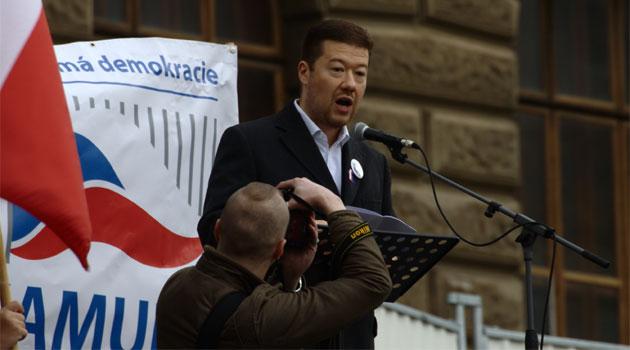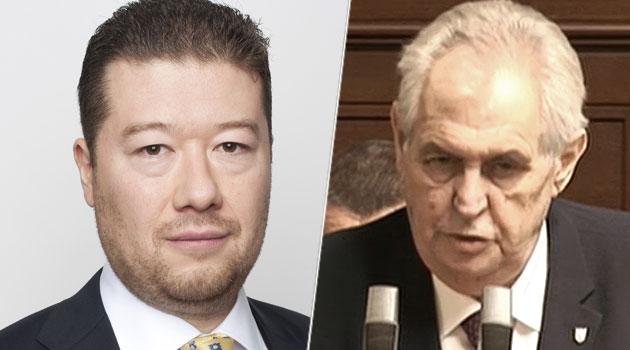Czech Government approves extremism report, rhetoric of some MPs is more radical than neo-Nazis' now

The “Freedom and Direct Democracy” (SPD) movement of Tomio Okamura is not an extremist party, according to the Czech Interior Ministry’s definition, but it does choose to focus on the same subjects as right-wing extremists. The movement has also managed to overshadow extremist parties on the right as it has been traditionally understood in the Czech context.
Those are the findings of the Annual Report on Extremism by the Interior Ministry for the year 2017, approved by the Government just before Christmas. Discussion of the material had reportedly been delayed by objections from the Czech President, who is said to have been bothered by the mention of the SPD in the document.
The material reports the SPD has officially distanced itself from totalitarian ideologies and does not espouse them in any covert way, such as by using visual symbols. According to the report, however, the SPD frequently takes positions on issues similar to those of right-wing extremists.
“In some cases the statements by SPD representatives are even more radical than the statements by representatives of extremist parties on the right as traditionally understood,” the document reads. It is exactly such speech, according to the Interior Ministry, that could contribute to radicalizing Muslims residing in the Czech Republic.
According to the document, the SPD has reshaped the Czech extremist scene. Right-wing extremists perceive the SPD to be their competition, but given the success Okamura’s movement has enjoyed, they have not allowed themselves to criticize it.
Left-wing extremists have also begun to define themselves more in contrast to the SPD than in contrast to extremist parties on the right. The extremism report calls the SPD an anti-immigration group using xenophobic populism to score political points.
“Otherwise legitimate subject matter (e.g., a critique of religion, immigration) are being used as part of their political struggle primarily as mobilizing tools creating an image of an enemy, with all of the consequences flowing from that. Through hateful invective against certain groups of inhabitants, they are contributing to an atmosphere of fear in society and to polarization,” the document says of anti-immigration movements, of which, according to the ministry, the SPD is the only one that has managed to succeed politically.
Extreme-right has become fragmented
The extremist movements on the right were significantly fragmented during 2017. The number of crimes motivated by extremism, after a previous decline, grew year-on-year by 1 to 153, and the Czech Police have clarified 102 of them.
“The main area where the extreme right commits crimes has become the Internet,” the report says. Crimes with a right-wing extremist subtext are being committed more and more frequently by individuals without any ties to the organized scene.
Extremists are said to have organized 334 public events. Of those, 235 were organized by the extreme left and 99 by the extreme right.
In the case of the right-wing extremist scene, according to the document, support declined for the Workers Social Justice Party (DSSS) and National Democracy (ND), while the Generation Identity (GI) and Pro-Vlast (“For the Homeland”) groups, which developed out of the neo-Nazi movement, showed almost no signs of existing. “The neo-Nazi traditional scene has de facto stopped appearing in public,” the report reads.
The extreme right, due to this decline in mobilization opportunities for anti-immigration and anti-Islamic subjects, has begun focusing on attitudes against the European Union, NATO, human rights activists, NGOs, and the current political representation. The militia and paramilitary groups created in association with the migration crisis have significantly weakened, according to the document.
The report says the main threat today is posed by populist, xenophobic groups, with extremist entities on the right as traditionally understood no longer representing a threat, according to the authors. The polarization of society, in their view, is being aided by the fast dissemination of hate speech through the Internet, and “quasi-media projects”, as the report calls them (i.e., the so-called alternative media) are assisting with spreading the hateful mood.
Moderate Muslim community could be radicalized by Czech politicians’ verbal assaults
According to the report, the Muslim community in the Czech Republic is moderate and well-integrated, but verbal assaults on the community by some domestic politicians could radicalize it nevertheless. Most of the community in the country makes moderate public statements.
“That conclusion is also confirmed by experts with both the intelligence services and police. Nevertheless, the security forces have registered several individuals who, within a closed circle of people, have expressed radical opinions,” reads the document.
Religionist Zdeněk Vojtíšek has confirmed to news server iROZHLAS.cz that the conclusions of the report for 2017 remain valid today. The police, according to the report, have also noted foreign nationals in the Czech Republic doing their best to disseminate a radical interpretation of Islam.
“These have been persons especially from the Caucausus and Central Asia who have attempted to establish contacts in the Czech Republic,” the report states. The Security Information Services (BIS) found in their annual report for last year that the number of foreign fighters with ties to the Czech Republic who have joined the fighting in the Middle East as members of terrorist organizations rose to 11 last year.
Some of those people, according to the Interior Ministry, now face prosecution. They are the relatives of a former imam in Prague who fought as part of a sister organization to Al Qaeda.
These people have been charged in the Czech Republic with participation in a terrorist organization and with terrorism. Former imam Samer Shehadeh, who faces charges of supporting terrorism, is in custody now.
Last year Shehadeh left the Czech Republic but was apprehended in Jordan, according to media reports. “Some persons from the Czech Republic have joined the activities of Kurdish armed groups fighting especially in areas of Iraq and Syria. Police investigated several cases of financial and logistical support for terrorist groups abroad. Several cases of suspects were investigated who allegedly attempted to arrange for medical care, training, or other material support for terrorists in the Czech Republic,” the ministry reports.
In previous years the extremism report has customarily been discussed by the Government in May. This year, however, that review was delayed, according to the media because the Czech President sought fundamental changes to the document, alleging that the text as drafted was biased and tendentious.
The President was reportedly bothered mainly by the mention of the SPD movement, which is seated in Parliament, in association with extremism. Czech Interior Minister Jan Hamáček (Czech Social Democratic Party – ČSSD) told the Czech News Agency earlier this month that the State Security Council had taken note of the document in its original version.
